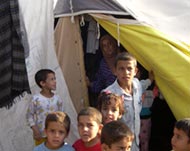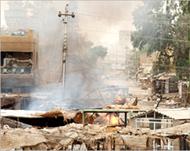Falluja plunges into humanitarian crisis
Aid agencies have called on US forces to allow them to deliver food, medicine and water to Falluja’s besieged citizens, calling the situation in the city a big disaster.

The Iraqi Red Crescent Society, which receives support from foreign agencies including the Red Cross and Unicef, said on Friday it had asked US forces and Iraq’s interim government to let them deliver relief goods to Falluja and establish medical centres there.
But it had received no reply, it said.
“We call on the Iraqi government and US forces to allow us to do our humanitarian duty to the innocent people,” said Red Crescent spokeswoman Firdus al-Ubadi.
“This is their responsibility,” she said, adding that judging by reports received from refugees and pictures broadcast on television, Falluja was a “big disaster”.
Civilian accounts
Luai Mansur Abd al-Karim, a Falluja resident who fled his home to a nearby suburb, told Aljazeera about the plight facing citizens in the city.
 |
|
Many Fallujans fled the fighting |
“The majority of them have stayed in the streets, in the open air,” he said. “They have no food, no shelter. Life necessities are very little.
“Humanitarian organisations cannot reach these families as all roads leading to the city and its suburbs are closed. Anyone who walks in the streets exposes his life to danger and his vehicle to being bombed.
“US forces have cordoned off the city and all its suburbs. They are conducting group killings and eliminations in Falluja and its suburbs. These families cannot go anywhere,” he said.
A US military spokesman said the Red Crescent had permission to help refugees in towns around Falluja, but could not say if it had granted access to the city itself.
Awaiting go-ahead
The Red Crescent has seven teams of doctors and relief workers, backed by trucks of food and other relief supplies ready to go into each of Falluja’s districts when the word is given.
|
“There’s no water. People are drinking dirty water. Children are dying. People are eating flour because there’s no proper food” Rasul Ibrahim, |
The International Committee of the Red Cross (ICRC) said on Friday it was seriously worried about the plight of civilians caught up in the Falluja fighting.
“According to the information we have received, some civilians are still trapped in Falluja,” ICRC spokeswoman Rana Sidani said. “We are very worried about their fate.”
The Iraqi Red Crescent is currently providing help to about 40,000 of the city’s inhabitants who have fled the fighting, the ICRC said.
In Falluja, “because of the fighting and the absence of medical staff, two medical centres which are not in the part of the city occupied by [US-led] allied forces are no longer functioning,” she said.
Combatants’ responsibility
“All those taking part in the combat have a responsibility to spare civilians and give access to the wounded,” Sidani added.
About 10,000 US soldiers, backed by heavy artillery and warplanes, surged into Falluja on Monday night, launching an attack against resistance fighters.
 |
|
Falluja has been the scene of |
Scores of buildings in Falluja have been completely destroyed, with TV footage showing some districts all but levelled. There has been no water and electricity for days and food shops have been closed. The stench of dead bodies is hanging over some areas of the city, residents said.
In one case earlier this week, a nine-year-old boy died after being hit in the stomach by shrapnel. Unable to reach a hospital, he died hours later of blood loss.
No medicine, doctors
“Anyone who gets injured is likely to die because there’s no medicine and they can’t get to doctors,” said Abd al-Hamid Salim, a volunteer with the Iraqi Red Crescent. “There are snipers everywhere. Go outside and you’re going to get shot.”
Rasul Ibrahim, a father of three, fled Falluja on Thursday morning and arrived with his wife and children in Habbaniya, about 20km to the west, on Thursday night.
He said families left in the city were in desperate need.
“There’s no water. People are drinking dirty water. Children are dying. People are eating flour because there’s no proper food,” he told aid workers in Habbaniya, which has become a refugee camp, with about 2000 families sheltering there.
Ubadi said many families taking refuge in Habbaniya and other villages nearby were suffering from diarrhoea and malnutrition and needed medicine as well as basic necessities such as lentils, sugar, bread, tea and candles.